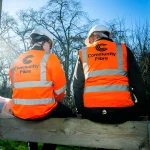Sponsored Links
Ofcom UK Study Reveals Stagnant Fixed Line Broadband ISP Market Growth
Posted: 02nd Dec, 2010 By: MarkJ
 Ofcom has just released its seventh annual Communications Market Report 2010 (CMR), which charts every conceivable variable of the UK's Television, Radio and Telecoms (Voice, Broadband ISP etc.) market. It reveals that total broadband uptake (mobile and fixed line) has risen by just +3% from 68% in 2009 to 71% now, which compares with a growth of +10% between 2008 and 2009.
Ofcom has just released its seventh annual Communications Market Report 2010 (CMR), which charts every conceivable variable of the UK's Television, Radio and Telecoms (Voice, Broadband ISP etc.) market. It reveals that total broadband uptake (mobile and fixed line) has risen by just +3% from 68% in 2009 to 71% now, which compares with a growth of +10% between 2008 and 2009.Sadly nearly that entire marginal rise appears to have come from Mobile Broadband services. Some 65% of UK households now have a fixed-line broadband connection, which remains unchanged from 2009. Ofcom has posted an interesting break down of service coverage, although this doesn't cover 2010. Curiously Virgin Media saw its cable broadband platform shrink between 2008 and 2009.

Elsewhere the average headline (advertised) broadband speed is now 9.4Mbps (2009), which is a huge growth from 6.9Mbps in 2008. This is largely attributable to the uptake of 'up to' 24Mbps ADSL2+ technologies last year. However Ofcom's May 2010 data showed that average real world speeds are still far lower at just 5.2Mbps (full details), with the gap getting wider each year.
Just 0.2% of UK households have a super-fast (NGA) broadband service, which Ofcom usually refers to as being any technology that can "achieve higher speeds than 24 Mbps". This puts us behind most modern countries, although that should improve rapidly over the next few years as BT and Virgin Media upgrade their networks.
Consumer internet ( IP ) usage represented 78% of the UK's traffic, with business use accounting for the remainder. Only 15% of this internet traffic was website browsing, with File Sharing (P2P) accounting for 30% and online video for another 30%. It's worth looking at how this growing online data usage has affected market revenue.

As you can see above the rate of data usage has increased rapidly, yet market revenue has stayed fairly static. The UK market is aggressively competitive, which has caused many of the largest broadband providers to cut their prices and left precious little room for profit.
This is part of the reason why some ISPs are so opposed to the principal of treating all internet traffic as equal (Net Neutrality). Charging content providers to help boost ISP revenue is seen as fair game in a market where putting up prices can be extremely dangerous. However restricting access to popular content, such as when those content developers fail to pay up, could prove to be equally disastrous.
Ofcom's Full CMR Report 2010http://www.ofcom.org.uk/cmr
Search ISP News
Search ISP Listings
Search ISP Reviews
Latest UK ISP News








Cheap BIG ISPs for 100Mbps+
150,000+ Customers | View More ISPs
Cheapest ISPs for 100Mbps+
Modest Availability | View More ISPs
Latest UK ISP News
Helpful ISP Guides and Tips
Sponsored Links
The Top 15 Category Tags
- FTTP (6802)
- BT (3882)
- Politics (3076)
- Business (2767)
- Openreach (2663)
- Building Digital UK (2513)
- Mobile Broadband (2476)
- FTTC (2142)
- Statistics (2130)
- 4G (2093)
- Virgin Media (2026)
- Ofcom Regulation (1780)
- 5G (1733)
- Fibre Optic (1604)
- Wireless Internet (1595)
Sponsored
Copyright © 1999 to Present - ISPreview.co.uk - All Rights Reserved - Terms , Privacy and Cookie Policy , Links , Website Rules






























